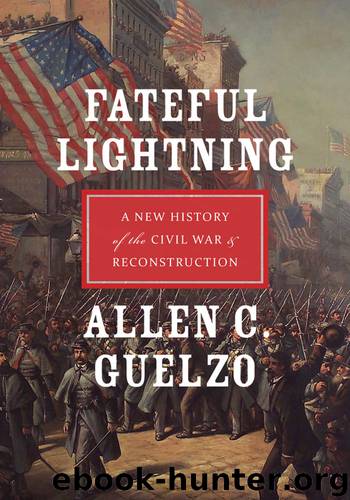Fateful Lightning by Allen C. Guelzo

Author:Allen C. Guelzo
Language: eng
Format: epub
Publisher: Oxford University Press
Published: 2012-03-16T16:00:00+00:00
THE WAR AT SEA
Lincoln’s decision to impose a naval blockade of the Confederacy broadened, at one stroke, the scope of the American Civil War to take in the seven seas as well as the Confederate heartland. By the same token, the Confederacy could ill afford to stand by and allow the Federal navy to put its hands around the Confederacy’s neck and wring it. So between the Federal navy’s determination to choke the Confederates inside their own harbors and the Confederacy’s desperation to find some way of forcing the Federal navy to loosen its grip, the Civil War spread outward from land to sea, and from there around the world.
In 1861, the U.S. Navy carried 1,500 officers and about 7,500 sailors on its active list; the cream of the fleet were the six big 5,000-ton steam frigates, Niagara, Roanoke, Colorado, Merrimack, Minnesota, and Wabash, launched in 1855 and carrying batteries of up to forty 9-inch, 10-inch, and 11-inch smoothbore cannon (and with room for some specialty armament as well, such as the Minnesota’s 150-pound Parrott rifle and the Niagara’s twelve 12-inch shell guns). Following the steam frigates were the twelve steam sloops of 1857 and 1858, the biggest of which—Hartford, Brooklyn, and Richmond—displaced 2,500 tons and carried sixteen to twenty 9-inch guns.41
None of these ships, however, had been designed for blockade duty. As it was, the outbreak of the war found all of the frigates in various navy yards undergoing all sorts of refitting and overhaul. One of them, the Merrimack, suffered from chronic engine trouble and was in dry dock for machinery repairs at Gosport Navy Yard at Norfolk when Virginia passed its secession ordinance. Despite the entreaties of Benjamin Isherwood, an army engineer sent expressly to Norfolk to get the Merrimack out of danger, the commandant of the yard ordered the steam frigate burned and scuttled to prevent it from falling into the hands of the Rebels. As with the ships, there was also some question about the reliability of the navy’s officers. Although only 237 of the navy’s officer corps resigned and went South at the beginning of the war, Federal admiral Samuel F. Du Pont was keenly aware of the fact that “not a single officer” in his South Atlantic Blockading Squadron in 1862 had “voted for Lincoln.” At the same time, Du Pont was also aware that “there is not a proslavery man among them,” and the officers who had some chance ashore to see the remains of the slave system for themselves experienced great awakenings. The aristocratic Du Pont, whose home was in the border slave state of Delaware, confessed that he had “been a sturdy conservative on this question, defended it over the world, argued for it as patriarchal in its tendencies… that the condition of the slaves was far in advance of the race in Africa.” Nevertheless, he was horrified by the conditions he found on the coastal plantations. Having seen “the institution ‘de pres,’” Du Pont wrote feelingly to a friend
Download
This site does not store any files on its server. We only index and link to content provided by other sites. Please contact the content providers to delete copyright contents if any and email us, we'll remove relevant links or contents immediately.
| Africa | Americas |
| Arctic & Antarctica | Asia |
| Australia & Oceania | Europe |
| Middle East | Russia |
| United States | World |
| Ancient Civilizations | Military |
| Historical Study & Educational Resources |
1861 by Adam Goodheart(1051)
Smithsonian Civil War by Smithsonian Institution(1011)
Abraham Lincoln: A Life, Volume 2 by Michael Burlingame(971)
The Fiery Trial by Eric Foner(940)
Battle Cry of Freedom by James M. McPherson(937)
Ulysses S. Grant by Michael Korda(934)
Rebel Yell: The Violence, Passion, and Redemption of Stonewall Jackson by S. C. Gwynne(929)
Rock of Chickamauga(927)
101 Things You Didn't Know About Lincoln by Brian Thornton(910)
Abraham Lincoln in the Kitchen by Rae Katherine Eighmey(865)
This Republic of Suffering: Death and the American Civil War by Drew Gilpin Faust(846)
Bloody Engagements by John R. Kelso(821)
Lincoln's Lieutenants by Stephen W. Sears(807)
Leaves of Grass by Walt Whitman(802)
Union by Colin Woodard(800)
The escape and suicide of John Wilkes Booth : or, The first true account of Lincoln's assassination, containing a complete confession by Booth(781)
1861: The Civil War Awakening by Adam Goodheart(755)
Rise to Greatness by David Von Drehle(738)
The Fiery Trial: Abraham Lincoln and American Slavery by Eric Foner(734)
